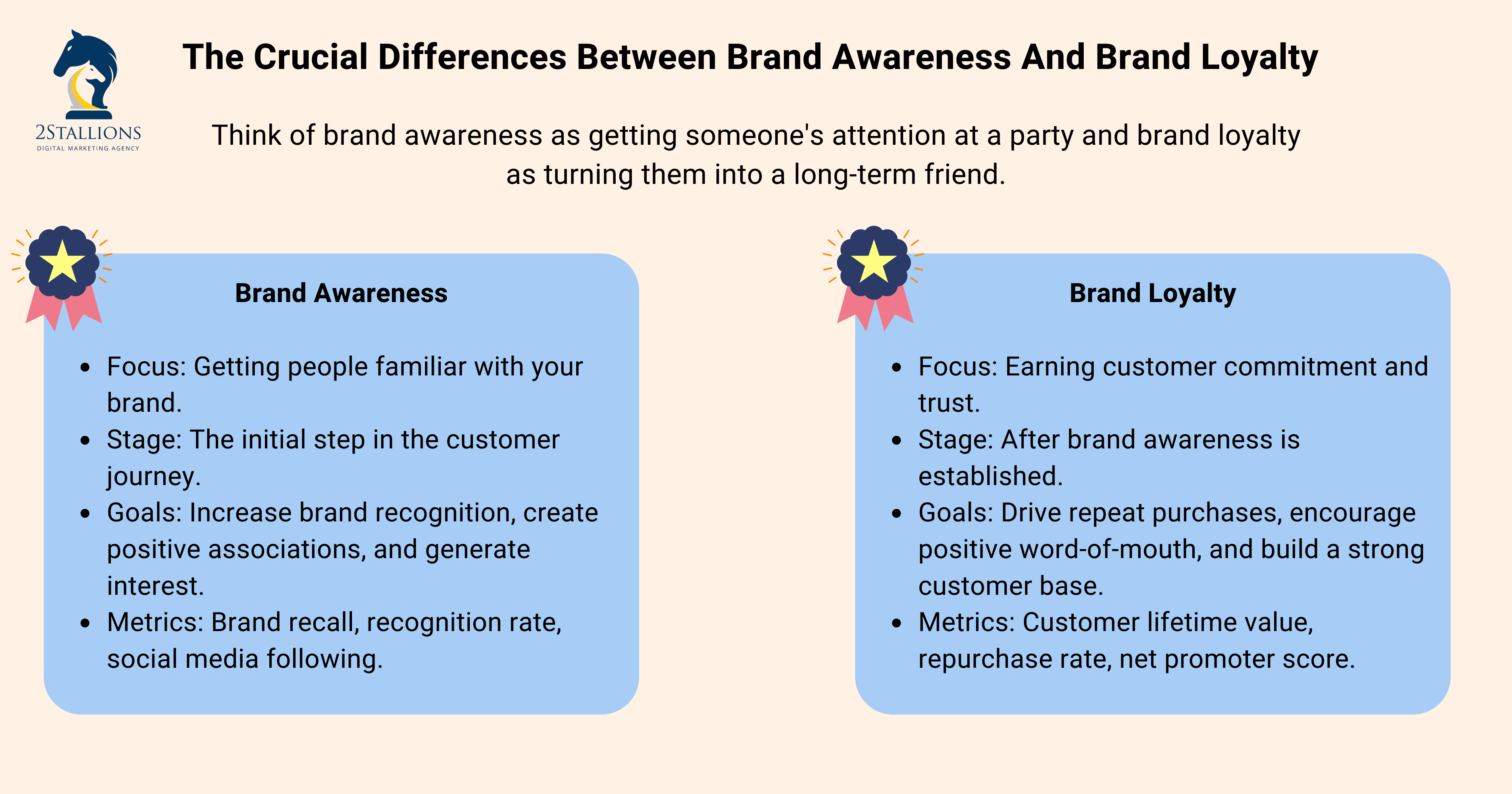Content
SHARE

Two concepts often emerge in the competitive business world: brand awareness and brand loyalty. These terms may seem similar, but they have distinct meanings and play different roles in a company’s success. Understanding the differences between brand awareness and brand loyalty is crucial for any business looking to build a strong reputation and maintain a loyal customer base. This article will dive into brand awareness and loyalty, explore their impact on consumer behaviour, discuss their importance in business strategy, and provide tips for achieving the optimal balance.
Understanding The Concepts: Brand Awareness And Brand Loyalty
Before we delve deeper into the differences between brand awareness and loyalty, let’s define these terms and understand their significance.
Brand awareness refers to the level of familiarity that consumers have with a particular brand. It is the extent to which potential customers recognise and remember a brand. Brand awareness can be measured by brand recognition, recall, and top-of-mind awareness.
Building brand awareness is crucial for businesses, creating a foundation for brand equity and recognition. When consumers are aware of a brand, they are more likely to consider it when purchasing and recommending it to others.
But how exactly can businesses go about building brand awareness? One effective strategy is through advertising. Companies can increase their brand’s visibility and reach a wider audience by investing in advertising campaigns across various channels, such as television, radio, print, and digital media. Another way is through public relations efforts, such as press releases and media coverage, which can generate buzz and raise awareness about the brand.
However, brand awareness is not just about being recognised; it’s also about being remembered. Companies can engage in activities such as sponsorships, events, and partnerships to ensure that their brand stays top-of-mind. By associating their brand with popular events or partnering with influential individuals or organisations, businesses can enhance their brand’s visibility and create lasting impressions in the minds of consumers.
Now, let’s move on to brand loyalty. Unlike brand awareness, which focuses on visibility, brand loyalty concerns customers’ emotional connection and allegiance to a brand. It is the degree to which customers consistently and exclusively choose a particular brand over alternatives.
Brand loyalty is built over time through positive experiences, customer satisfaction, and trust. When customers have positive interactions with a brand through exceptional customer service, high-quality products, or personalised experiences, they are more likely to develop a sense of loyalty towards that brand.
But how can businesses foster brand loyalty? One way is by providing exceptional customer service. When companies go above and beyond to meet their customer’s needs and resolve any issues promptly and effectively, it creates a positive impression. It strengthens the bond between the customer and the brand.
Another important factor in building brand loyalty is delivering consistent quality. When customers can rely on a brand to consistently deliver high-quality products or services, it builds trust and confidence, making them more likely to remain loyal to that brand.
Furthermore, businesses can also foster brand loyalty by implementing loyalty programs and rewards. Companies can encourage repeat purchases and reward their most loyal customers by offering incentives such as exclusive discounts, special promotions, or loyalty points.
The Crucial Differences Between Brand Awareness And Brand Loyalty
Now that we have defined brand awareness and loyalty, let’s explore their significant differences and impact on consumer behaviour.
How Brand Awareness And Brand Loyalty Impact Consumer Behaviour
Brand awareness influences the initial consideration set of consumers. When consumers know a brand, it becomes part of their consideration when looking for a product or service. It brings the brand to their attention and increases the likelihood of it being considered during decision-making.
On the other hand, brand loyalty goes beyond consideration and affects repeat purchases and customer retention. Loyal customers are less likely to switch to alternative brands and are more forgiving of occasional shortcomings. They trust the brand, have a positive perception of it, and are willing to invest time and money in their relationship with the brand.
The Role of Marketing In Brand Awareness And Brand Loyalty
Marketing plays a crucial role in both brand awareness and brand loyalty. For brand awareness, marketing activities focus on increasing the visibility and exposure of the brand to a wide audience. This includes advertising, public relations, social media campaigns, and other promotional efforts.
Regarding brand loyalty, marketing efforts shift towards building strong relationships and delivering value to existing customers. This involves personalised communication, loyalty programs, excellent customer service, and ongoing engagement to maintain and deepen the emotional connection.
The Importance of Brand Awareness In Business Strategy
Now that we have explored the differences between brand awareness and brand loyalty, let’s focus on why brand awareness is crucial for any business strategy.
Building Brand Awareness: Key Strategies
Building brand awareness requires effective strategies that maximise the brand’s visibility and promote recognition among the target audience. Some key strategies include:
- Invest in targeted advertising campaigns that reach the desired demographic.
- Creating compelling content that tells the brand’s story and engages consumers.
- Utilising social media platforms to connect with potential customers and foster brand awareness.
- Collaborating with influencers and brand ambassadors to increase reach and credibility.
Measuring The Success of Brand Awareness Campaigns
Measuring the success of brand awareness campaigns is essential to determine the effectiveness of the strategies employed. Key performance indicators (KPIs) to consider include:
- Reach: The number of people exposed to the brand’s message.
- Impressions: The total number of times the brand’s content has been displayed.
- Engagement: The level of interaction and response generated by the brand’s content.
- Brand recognition/recall: Testing consumers’ ability to recognise or recall the brand from advertising materials.
The Significance of Brand Loyalty In Maintaining Customer Base
While brand awareness is essential for attracting new customers, brand loyalty keeps them returning. Let’s explore why brand loyalty is crucial for maintaining a strong and loyal customer base.
Cultivating Brand Loyalty: Effective Techniques
Cultivating brand loyalty requires a consistent effort to meet and exceed customer expectations. Here are some effective techniques for nurturing brand loyalty:
- Deliver exceptional customer experiences by providing personalised and seamless interactions at every touchpoint.
- Reward loyal customers with exclusive offers, discounts, or loyalty programs.
- Build a community around the brand by encouraging customer feedback, engaging in conversations, and creating a sense of belonging.
- Continuously innovate and improve products or services to stay relevant and meet changing customer needs.
Assessing Brand Loyalty: Essential Metrics
- Tracking and assessing brand loyalty is crucial to measure the effectiveness of loyalty-building efforts. Key metrics to consider include:
- Customer retention rate: The percentage of customers who continue purchasing from the brand over a specific period.
- Net Promoter Score (NPS): A measure of customer satisfaction and loyalty based on their likelihood to recommend the brand to others.
- Repeat purchase rate: The percentage of customers who make multiple purchases from the brand.
- Customer lifetime value: The predicted value a customer brings to the brand over their lifetime.
Balancing Brand Awareness And Brand Loyalty For Business Success
While brand awareness and loyalty are distinct concepts, finding the right balance is crucial for business success. Let’s explore the interplay between brand awareness and loyalty and provide tips for achieving an optimal balance.
The Interplay Between Brand Awareness And Brand Loyalty
Brand awareness and brand loyalty are intertwined. Initially, brand awareness helps attract customers and introduces them to a brand. As customers become more familiar and develop trust, brand loyalty takes hold. Brand loyalty, in turn, reinforces brand awareness by advocating for and recommending the brand to others.
Achieving The Optimal Balance: Tips And Strategies
To achieve an optimal balance between brand awareness and brand loyalty, consider the following tips and strategies:
- Focus on creating meaningful brand experiences that resonate with new and existing customers.
- Invest in ongoing marketing efforts to maintain and enhance brand visibility while engaging with loyal customers.
- Personalise your communication and marketing messages to cater to different segments of your target audience.
- Regularly assess and refine your brand strategy to adapt to changing market dynamics and customer expectations.
Building brand awareness and loyalty are ongoing processes requiring continuous effort and adaptation. By understanding the differences between the two concepts and implementing effective strategies, businesses can create a strong brand presence, attract new customers, and maintain a loyal customer base for long-term success.
Frequently Asked Questions About Brand Awareness and Brand Loyalty
What Is The Difference Between Brand Awareness And Brand Loyalty?
Brand awareness refers to the extent to which consumers are familiar with and recognise a brand. It measures the brand’s visibility and recognition in the marketplace. On the other hand, brand loyalty is the degree to which customers repeatedly purchase products or services from the same brand over time despite the availability of alternatives. At the same time, brand awareness focuses on recognition and familiarity. Brand loyalty emphasises customer commitment and repeat purchases.
What Is Brand Loyalty, And Why Is It Important?
Brand loyalty is the tendency of customers to choose a particular brand over others in the market consistently. It is important because it leads to repeat purchases, higher customer lifetime value, reduced marketing costs, and positive word-of-mouth recommendations. Brand loyal customers often become brand advocates, promoting the brand to others and contributing to its long-term success. Additionally, in competitive markets, brand loyalty acts as a barrier to entry for competitors, making it more difficult for them to attract customers away from the established brand.
Why Is Brand Awareness Important?
Brand awareness is crucial because it lays the foundation for brand recognition, recall, and consumer consideration. It ensures that a brand is top-of-mind when consumers make purchasing decisions within its product or service category. Increased brand awareness leads to greater visibility, market share, and customer acquisition. Moreover, strong brand awareness can help differentiate a brand from competitors and create a favourable perception among consumers, ultimately driving sales and revenue growth.
What Is The Difference Between Branding And Awareness?
Branding refers to the strategic process of creating and managing a brand’s identity, which includes its name, logo, visual elements, messaging, and values. It involves shaping the perceptions and associations that consumers have with the brand. On the other hand, brand awareness is one of the outcomes of effective branding. It specifically focuses on the level of recognition and familiarity consumers have with the brand in the marketplace. While branding is about shaping the brand’s identity and positioning, brand awareness ensures that consumers know and recognise the brand.

















